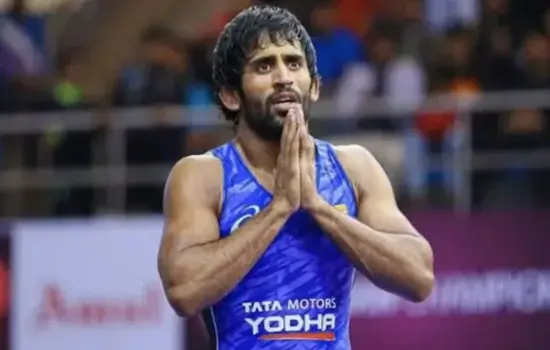Bajrang Punia, India’s celebrated wrestler and Tokyo Olympics bronze medalist, has been handed a four-year suspension by the National Anti-Doping Agency (NADA) for allegedly evading a mandatory doping test. This development has sent ripples through the sports community, raising critical discussions about anti-doping protocols, athlete responsibilities, and the broader implications for Indian wrestling.
Incident Overview
The controversy centers on an incident from March 10, 2024, during selection trials in Sonepat, Haryana. NADA officials assert that Punia refused to provide a urine sample when approached for testing. Despite multiple requests and explanations of the consequences, Punia allegedly declined to comply. This refusal led to a provisional suspension on April 23, 2024, which has now culminated in a formal four-year ban.
Punia’s Defense

Punia has contested NADA’s claims, stating that he did not refuse the test but raised concerns about the testing kits’ validity. He alleges that on previous occasions, officials arrived with expired kits, prompting him to seek clarification before proceeding with the sample collection. In a social media statement, Punia emphasized, “I never refused to give my sample to NADA officials. I requested them to first answer me as to what action they took on the expired kit they brought to take my sample.”
Legal Proceedings and Outcomes
Following the provisional suspension, Punia appealed the decision. NADA’s Anti-Disciplinary Doping Panel (ADDP) initially lifted the suspension on May 31, 2024, pending a formal notice of charge. However, upon issuing the notice on June 23, 2024, NADA reinstated the suspension. Subsequent hearings led to the ADDP’s decision to impose a four-year ban, effective from April 23, 2024, the date of the provisional suspension.
Implications for Punia’s Career
The suspension sidelines Punia until April 22, 2028, effectively ruling him out of major competitions, including the 2028 Los Angeles Olympics. At 30, this ban could significantly impact the trajectory of his wrestling career, potentially curtailing his competitive tenure at the international level.
Broader Impact on Indian Wrestling
Punia’s suspension is a significant setback for Indian wrestling, given his stature and contributions to the sport. It underscores the critical importance of adherence to anti-doping regulations and the need for athletes to engage proactively with testing authorities. The incident also highlights the necessity for transparent and efficient communication between athletes and regulatory bodies to prevent misunderstandings that could lead to severe penalties.
The Role of Anti-Doping Agencies
NADA’s actions reflect its commitment to maintaining the integrity of sports through stringent anti-doping measures. The agency’s protocols are designed to ensure fair play and uphold the credibility of athletic competitions. However, this case brings to light the challenges in balancing rigorous enforcement with addressing athletes’ legitimate concerns, such as the validity of testing equipment.
Athlete Rights and Responsibilities
Athletes are obligated to comply with doping control procedures, including providing samples upon request. Simultaneously, they have the right to question and seek clarification on the procedures to ensure fairness and accuracy. This case emphasizes the need for clear guidelines and effective communication channels to address any issues promptly, thereby safeguarding both the athletes’ rights and the integrity of the testing process.
Conclusion
The four-year suspension of Bajrang Punia serves as a poignant reminder of the complexities inherent in anti-doping regulations and the critical importance of transparent communication between athletes and regulatory bodies. As the sports community reflects on this development, it is imperative to reinforce education on anti-doping protocols and ensure that athletes are well-informed about their rights and responsibilities. Such measures are vital to uphold the sanctity of sports and protect the careers of dedicated athletes.